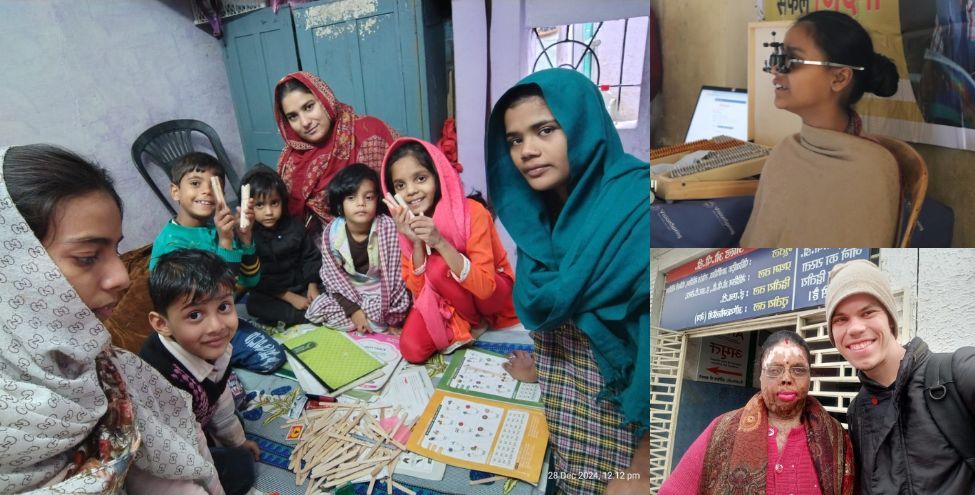J1143N Medical Entitlements Literacy Assistance, India
India, Indian Subcontinent
In partnership with DEVI Sansthan (Dignity, Education, Vision International)





Context
Our project, MELA (which means ‘festive fair’ in Hindi) works in several urban poor communities in central Lucknow – the capital of Uttar Pradesh, India’s most populous state. Many people have migrated to the city seeking employment and a better life, but often end up in the harsh conditions of urban informal settlements (slums) built illegally on marginal land – for instance, by the side of railway tracks and sewage canals. Here they struggle to eke out a living, often lacking access to healthcare, education and various key government schemes.
Your change can bring change!
- For half the price of a coffee (US$2/A$3) you can help someone get their eyes tested and make glasses. This can help in myriad ways – from reducing headaches to enabling reading and helping people get back to work.
- For the price of a Big Mac meal (US$6/A$9) you can help a widow, senior citizen or person with a disability apply for a government pension, which will give them a small (US$12/A$18 per month), but stable source of income for the rest of their lives.
- For the price of a fancy meal out (US$30/A$45) you can make a permanent difference in a family’s cooking situation by helping them get a gas connection. Compared to inefficient wood stoves, this is much healthier, more convenient, and lowers greenhouse gas emissions.
- For the price of a couple books (US$50/A$75) you can help a child through a 6 month one-on one literacy course to learn to read their mother-tongue, Hindi. This makes it more likely that they will stay in school longer, learn more while there, and become healthier and more productive citizens when they grow up.
We estimate that these interventions have a tremendous benefit-cost ratio of more than 10:1. For detailed cost-effectiveness modelling of our work, see here.
To sign up to the MELA newsletter, please write to Tom at tom@dignityeducation.org.
Our work in more detail (M.E.L.A. = Medical, Entitlements, Literacy, Assistance)
- Medical: Often the poor are unable to access the healthcare they need, due to the complexity and expensiveness of the medical system. We help by taking people to hospitals (in the public health system), buying medicines, and giving cash support to patients. Over the past few years, we have taken hundreds of people to hospital for a huge array of issues – from broken bones to bronchitis, from tuberculosis to thyroid complaints! We’ve also had the privilege to witness a few people recover fully from very critical illnesses. As of Jan 2025, we have helped over 3,000 people navigate the medical system and/or pay for medical expenses.
- Entitlements: We help people complete application forms and submit them at various government offices for key documentation and services, including Aadhar cards (basic ID), ration cards (subsidized food grain), and pensions (disability, old age & widows). A primary focus has been gas connections, as the fuel transition from wood to gas has huge health, environmental and economic benefits. The main reason that many people still do not have a government gas connection is the upfront cost. In our project, we are subsidizing half the upfront cost of the connection. As of Jan 2025, we have helped over 300 people get pensions and 600 people get gas connections.
- Literacy: We use the Accelerating Learning for All Literacy program, which is based on asking questions of the learner and giving them time to think. This is much swifter and more effective than the rote learning methods commonly used in India. We run about 10 literacy classes in various slums, reaching about 150 kids at any given time, giving them individual attention and facilitating peer learning. As of Jan 2025, over 500 kids and a handful of adults have become literate.
Theory of Change
- The project has evolved primarily in response to the perceived needs of the local community, rather than imposing outside agendas.
- We focus on interventions that help people in the long term, and have holistic benefits: better health, income and social relations.
- The project employs people who are themselves from the slum community to serve as literacy teachers, health workers, and documentation liaisons. As well as providing stable employment, we strive to build up our team members’ skills and knowledge, in areas including project management, computer & admin skills, and understanding medical and government systems. This builds their capacity to continue to serve as community change agents in the long term.
Budget transparency
As of Jan 2025, our monthly budget is INR 180,000 (about US$2,200/A$3300).
- Cause area breakdown: 50% on medical, 25% on entitlements, 25% on literacy.
- Thematic breakdown: 40% on stipends for our 10 staff, 60% on paying for medicines, gas connections, books etc.
- We have almost no overheads as we don’t have an office, vehicle etc, instead running literacy classes and events in people’s homes or community spaces.
J1143N

